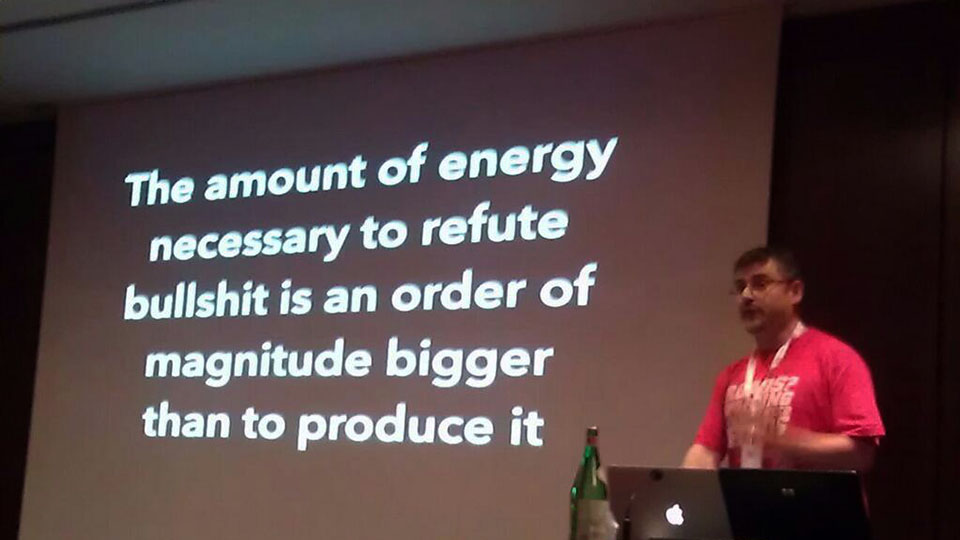Bullshit Thermodynamics
22 Jun 2020If we agree that, as Alberto Brandolini proposed in 2013, it takes an order of magnitude more effort to refute bullshit than it takes to produce it, this implies that societies are subject to the laws of thermodynamics.
A sea half of water and half of poison is not in balance.
A body half alive and half dead is not in balance.
— Seth Dickinson, Book of Unveiling
I think nihilism is the sociopolitical equivalent of entropy. Both are natural — even necessary, in moderation — yet lethal in excess. Civilization, like homeostasis, is not a stable equilibrium. Living systems require energy to maintain their internal relationships. Without upkeep, organisms and societies alike dissolve into randomness.
We don’t need cosmic certainty or divine truth to counteract nihilism, but if we don’t have at least some shared concept of reality, we’re aliens to each other.

To say that reality can be known and measured is as much a political statement in 2020 as it was under the 16th-century Roman Inquisition. Only this time, rather than Catholic dogma, it is imperial postmodernism that has politicized the concept of knowledge.
It wasn’t the top-down machinations of secret societies that brought Earth civilization to its knees. The interests of power have always been malign, but our whole culture has wallowed in collective negligence for centuries. Now all the bills have come due at the same time, and we’re going to need some machinations to survive.
The main thing that I learned about conspiracy theory is that conspiracy theorists actually believe in a conspiracy because that is more comforting. The truth of the world is that it is chaotic.
— Alan Moore
We’re here because we never had a plan, and now we need one.
But towers of stolen wealth still dot the landscape. And those atop the towers can see trouble on the horizon; they know that any viable plan for the future of humanity would first require an end to their exploitative customs. Some have even felt the warming seas lapping at their foundations. Naturally, they’ve decided they’d rather doom us all than climb down.
As they prop up their towers with the scorched, brittle timber of the commons, the aristocrats transform the infinite game of civilization into a finite one, with zero-sum victory conditions. They’re playing for keeps against the rest of us, and they’ve learned they can paralyze whole populations just by raising the cognitive price of seeking the truth.
[It] isn’t exactly a denial of truth as such. It’s more a growing weariness over the process of finding the truth at all. And that weariness leads more and more people to abandon the idea that the truth is knowable.
— Sean Illing, Vox
That social media users seem happy to contribute, at no extra charge, is one of those jokes that will only be funny to 23rd-century historians, and then only ruefully. On the internet, the powerful don’t just control wealth and resources; they control epistemology.
We’re back to having god-kings. Khufu would be impressed.
If this strategy is followed to its logical conclusion, the amount of bullshit being propagated by our hopelessly naïve filtering algorithms will eventually exceed the ability of the human intellect to parse salient information from torrents of raw data.
There will be a heat death of consensus.
Bizarre as it sounds, there is a historical precedent for this. During the decline of the USSR, Soviet bureaucrats found themselves so deeply entrenched in a failing system that political and economic alternatives became more or less unthinkable. So they simply ignored all signs of impending collapse and declared that everything was fine.
Soviet citizens could see the obvious fiction, of course, but most were so exhausted by the prospect of fighting against it that they just gave up and became cynics. In the absence of earnest counterarguments, the bureaucratic fiction became the dominant cultural narrative by default, even though no one fully believed it. Berkeley historian Alexei Yurchak called this phenomenon hypernormalization.
Decades after the fall of the USSR, nihilism and distrust of government linger in the former Soviet bloc. Vladimir Putin and his cadre of political technologists, notably Vladislav Surkov, have long taken advantage of this, using techniques from corporate marketing and avant-garde theater to make the landscape as confusing as possible.

By portraying their government as the only stable institution in an unstable world, they can turn any opposition to their advantage, making their grip on power unassailable.
The Kremlin’s idea is to own all forms of political discourse, to not let any independent movements develop outside of its walls. Its Moscow can feel like an oligarchy in the morning and a democracy in the afternoon, a monarchy for dinner and a totalitarian state by bedtime.
— Peter Pomerantsev, The Atlantic
There are obvious parallels here to both capitalist realism and the American far right. It’s not hard to draw a line from Surkov’s political theater to the “flood the zone with shit” doctrine attributed to Steve Bannon, the de facto architect of the alt-right.
In a sense, Bannon is as much the distorted American reflection of Surkov as Donald Trump is of Putin; a crude, meatheaded facsimile perfectly suited to a nation crippled by a medieval education system. While Putin and Surkov play four-dimensional chess, Trump and Bannon just play regular chess, but against a population that still hasn’t learned checkers. If they win, the next age of postmodernism is going to make this one look like a picnic.
We’re an empire now, and when we act, we create our own reality. And while you’re studying that reality — judiciously, as you will — we’ll act again, creating other new realities, which you can study too, and that’s how things will sort out. We’re history’s actors … and you, all of you, will be left to just study what we do.
— Unnamed White House Official, New York Times
I wish I could think of a healthy way for all of us to deal with this. For my part, I’ll have to rely on the proud Greek tradition of being morally insufferable and loudly proclaiming that the gods are wrong until they drown me in the Aegean or strangle me with serpents.